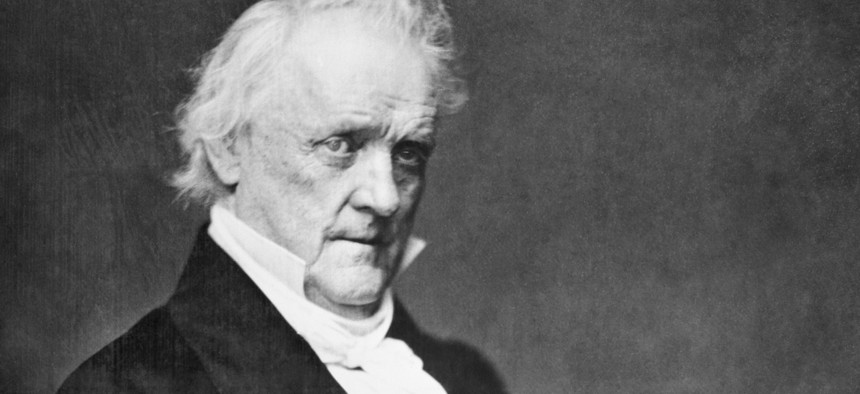
President James Buchanan aka Old Public Functionary. Bettmann/Getty Images
That time when calling a president ‘old’ was a compliment
You’ve probably heard of Old Hickory. But what about Old Public Functionary?
In last year’s presidential election, the issue of age played a prominent role. Joe Biden was 81 at the time he dropped out of the race, a fact that Donald Trump never missed an opportunity to highlight. Trump himself was 78 at the time of his second inauguration in January, the oldest person ever to take the oath of office as the nation’s chief executive.
“Old” was an epithet in the race, and in American politics generally. But believe it or not, there was a time–and a rather lengthy one, at that–when a colloquial honorific bestowed upon a president that began with “old” was a high honor. Its connotation (most of the time) was wisdom, experience, resolve and trusted leadership.
Thus, for example, we have Old Hickory, Andrew Jackson, so designated for being as tough in battle as that type of hardwood.
One of his predecessors, John Adams, was sometimes called Old Oak. His son, John Quincy was referred to as Old Man Eloquent, a nod to his speaking skill–which also led to another moniker, Old Sink or Swim, taken from a turn of phrase in one of his addresses. Military hero Zachary Taylor earned the nickname Old Rough and Ready.
By the 20th century, the tradition had all but died out. Herbert Hoover was sometimes known as the Grand Old Man, but that had more to do with his being a member of the Grand Old Party than for his own checkered record.
While the “old” appendage was frequently a badge of honor, in some cases, it was used with tongue firmly in cheek. Consider the case of James Buchanan, widely viewed as one of the most ineffectual presidents ever to hold the office. His nickname?
Old Public Functionary.
The sad part is that Buchanan gave the moniker to himself. In his 1859 State of the Union message to Congress, with the country sliding inexorably toward civil war, Buchanan had this to say:
Let me implore my countrymen, North and South, to cultivate the ancient feelings of mutual forbearance and good will toward each other and strive to allay the demon spirit of sectional hatred and strife now alive in the land. This advice proceeds from the heart of an old public functionary whose service commenced in the last generation, among the wise and conservative statesmen of that day, now nearly all passed away, and whose first and dearest earthly wish is to leave his country tranquil, prosperous, united, and powerful.
Buchanan’s effort to place himself among the “wise and conservative statesman” of his time was in vain.
In a precursor to the modern era, some presidents were referred to as “old” simply because they were long in the tooth, at least by the standards of their times. William Henry Harrison was sometimes called Old Granny because he was the ripe old age of 68 when he took office in 1841.
As if to validate concerns about his ability to hold up to the rigors of the highest office in the land, Harrison fell ill and died after only a month in office.







